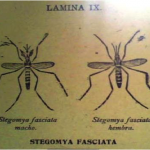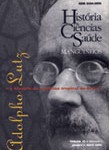June 2015

Artistic intervention on photograph of main entrance of the Hospital of Santa Casa de Misericórdia do Pará, 1900 (O Município de Belém, 1906, 1907, s.p.)
Glauber Gonçalves | Casa de Oswaldo Cruz
The new issue of História, Ciências, Saúde – Manguinhos includes a series of articles that explore the connections between the fields of health and education from different perspectives. Among the issues discussed in the publication and related to these two areas are guidelines for health education in Brazilian schools and health education in the fight against smallpox in Mexico. This issue also includes texts on various topics, from decentralization of health services in Argentina to the mechanisms for building narratives on sexuality.
The diseases that weakened and killed soldiers and sailors of the Dutch West India Company during its incursions into the northeast of Brazil during the seventeenth century are the subject of the first article in this issue of HCS-Manguinhos. In the study, the authors indicate that, at times, warfare was less dangerous to the military than the diseases that they suffered during the period of occupation. The troops, who suffered from precarious food supply and other setbacks, were frequently described as “sick and unable to march.”
Another article examines the transformations that the Mexican vaccination programs underwent beginning in 1943, when the National Smallpox Campaign was established. In addition to analyzing the arguments which attribute to smallpox vaccination a central role in consolidating a culture of prevention in Mexico, the author seeks to understand why selective vaccination and persuasion were chosen, and the extent of health education programs.
This issue of HCS-Manguinhos also contains a study on the relationship between the expansion of the activities of the Santa Casa de Misericórdia do Pará, one of the first hospitals in what was then the Grão-Pará province, and hygienist policies implemented in the city of Belém in the late nineteenth century. Next, the article Variations on the “scientific culture” in four Brazilian authors analyzes the transformations and continuities related to this concept in the works of Miguel Ozorio de Almeida, Anízio Teixeira, Maurício Rocha e Silva and Carlos Vogt, influential personalities in Brazilian scientific and educational policies.
This issue also includes a discussion on the reconstruction of the significance of leprosy in Minas Gerais in the 1950s and another article that discusses the ideas put forth by Cuban Fernando Ortiz y Fernandes in his work Hampa afro-cubana: los negros brujos, in addition to studies on the activities of the São Paulo State School Medical Inspection Service, an agency created in 1911; the emergence of Child Health Centers in Mexico City in the first half of the twentieth century; and the yellow fever epidemics in the city of Campinas in the late nineteenth century.
The section Sources includes a contribution on the concept of geohistory, developed by the French historian Fernand Braudel in his text Géohistoire: la société, l’espace e le temps, published for the first time in Portuguese in this issue of HCS-Manguinhos. The concept completes the author’s criticism of disciplinary boundaries and expresses the relevance of geography in forming his long-term historical method.
In a letter published in this issue, Jaime Benchimol, one of the founders of the journal, addresses his decision to leave his position as scientific editor after 21 years with the publication. “Tremendous changes have taken place and are still underway in the world of scholarly journals and science communication. História, Ciências, Saúde – Manguinhos has been successful in adapting; even more, it has been successful in making innovative use of new communication technologies, media, and languages. It has become a respected journal in the field of history and other realms of academia, and this makes me very proud.
The new science editors, Marcos Cueto and André Felipe Cândido da Silva, comment in their letter on the challenges they face and provide details on the publication’s editorial policy, which will continue along the general lines implemented by Benchimol, seeking to now meet new demands for internationalization, in addition to reflecting more faithfully the regional, thematic, disciplinary and institutional diversity in academia.
Click here to view the table of contents of HCS-Manguinhos (vol.22, no.2, Apr./Jun. 2015).
How to cite this post [ISO 690/2010]:
HCS-Manguinhos features dialogs between health and education. História, Ciências, Saúde – Manguinhos Blog [viewed DD MM YYYY]. Available from: http://www.revistahcsm.coc.fiocruz.br/english/hcs-manguinhos-publishes-articles-on-dialogs-between-health-and-education/








